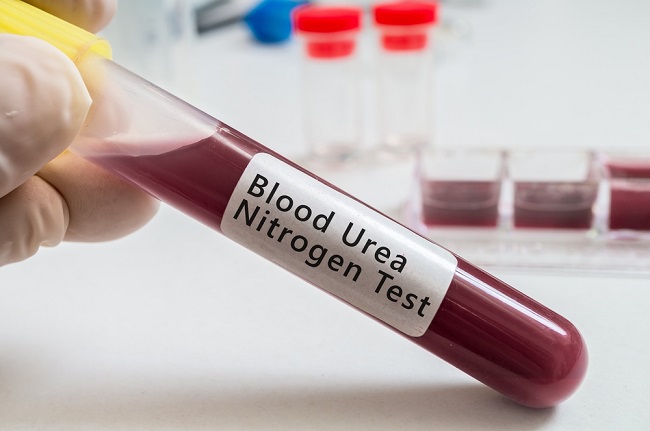Definition
A blood urea nitrogen (BUN) test analyzes the level of urea through the detection of the nitrogen within the molecule. High levels of urea within the blood can be a sign that certain body systems are not functioning properly, especially the kidneys.
BUN Test Explained
A BUN test can be done for several reasons: to determine whether a kidney is healthy, to see whether a malfunctioning kidney is worsening or improving, to find out whether treatment of kidney disease is working, or to analyze other factors such as severe dehydration. The results of a blood urea nitrogen test can also provide information about the health of the respiratory system, the digestive system, or the circulatory system.

Depending on the range of urea levels found within the blood, a doctor can make several determinations on how various body systems are functioning. Both high and low blood urea nitrogen levels can be signs of body distress or disorders in specific body systems.
Blood Urea Nitrogen Ranges
As with multiple clinical assessments, the levels of urea nitrogen in the blood have been well studied and a reference range has been established to determine whether the kidney is healthy or not, i.e. whether the blood urea nitrogen levels fall within normal values.
In adults, normal values are considered between 10 and 20 mg/dL, or between 3.6 and 7.1 mmol/L. In children, the healthy reference range is from 5 to 18 mg/dL or between 1.8 and 6.4 mmol/L. When the blood urea nitrogen values fall out of the reference range, it is very likely that there is some kind of abnormality in the body, most probably related to the kidney. Levels outside of the normal values could also indicate that something is wrong with the way your liver is processing proteins.
High Levels of Blood Urea Nitrogen
Several factors can give rise to high levels of blood urea nitrogen, which are levels above the reference value. The most probable factor is kidney damage. Kidney disease or kidney injury can originate from multiple sources such as from high blood pressure and from diabetes. A creatinine blood test in conjunction with a BUN test can help confirm kidney damage.
Other factors that cause high blood urea nitrogen may involve the respiratory, circulatory and gastrointestinal tracts. For instance, internal bleeding or tissue damage may raise urea nitrogen in the blood. Additional factors include dehydration and a high-protein diet (more protein leads to more protein breakdown and consequently to more urea in the blood). Some medicines can also instigate high levels of blood urea nitrogen.
Low Levels of Blood Urea Nitrogen
A lowered level of blood urea nitrogen is not as indicative of kidney issues as high levels. Decreased blood urea levels are instead usually associated with liver damage, malnutrition, overhydration or a low-protein diet. Some medicines may also induce low levels of blood urea nitrogen.
How is Blood Urea Nitrogen Created?
The BUN test measures the nitrogen present in the waste product urea found within the blood. Urea is the waste product of protein breakdown carried out in the liver. After being created in the liver, urea is excreted to the bloodstream. In the bloodstream, it travels to the kidneys to be eliminated. It is removed from the bloodstream and added to the urine in the kidneys.
The levels of urea nitrogen can be assessed when it is in the bloodstream by obtaining blood samples. These levels are indicative of kidney and liver health but they can also help identify other diseases and damage to body systems. Other systems that may be affected include the respiratory, the digestive and the circulatory systems. A BUN test may show levels outside the normal range if any of these systems are broken or malfunctioning.
Elimination of Protein
The elimination of protein from the body goes through a few steps. First, proteins reach the liver, where they are broken down by enzymes. Aminoacids—the “pieces” that form proteins—are used by our cells for many purposes. In the process of breaking down proteins, urea is created as a waste product. Urea is then secreted by the liver into the bloodstream.
It eventually reaches the kidneys, which function to separate urea from the blood and excrete the urea into the urine. If the kidneys are malfunctioning, the urea will not be separated from the blood and the blood urea nitrogen will hence be higher.
High Protein Diets
Mechanisms within the body regulate how much protein our cells can use. The rest needs to be excreted as it can disrupt the function of cells and tissues. People on a high-protein diet often have high levels of blood urea nitrogen because their livers are working in overdrive to process and remove excess protein.
These types of diets have grown significantly in popularity in recent years, likely due to the large amounts of water people need to excrete all of the excess protein. Water weighs 8 pounds per gallon, which is where a majority of the weight loss on these diets comes from. Unfortunately, this water weight is instantly gained back when a person switches off of a high-protein diet. Further, increased urea in the blood creates acidification, which can lead to a number of degenerative conditions. For this reason, high-protein diets are largely an unhealthy way to lose weight.
Quiz
